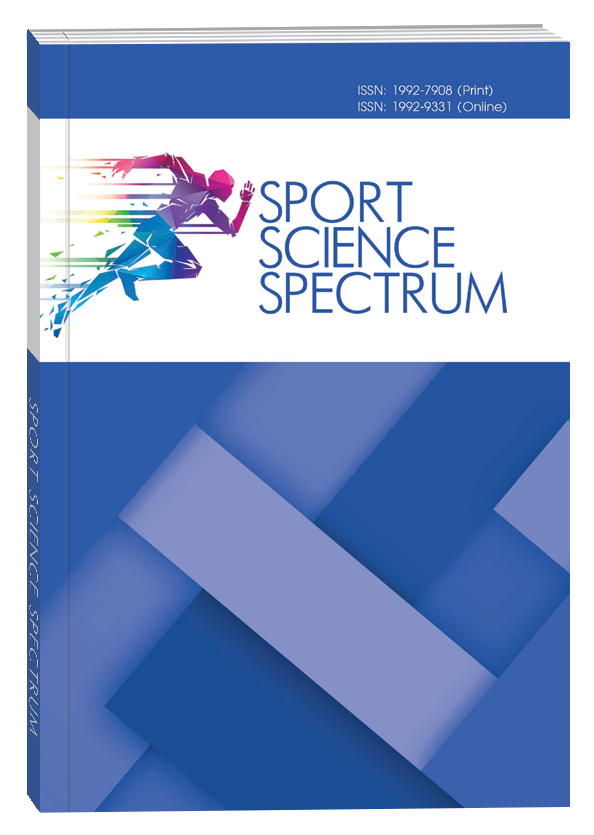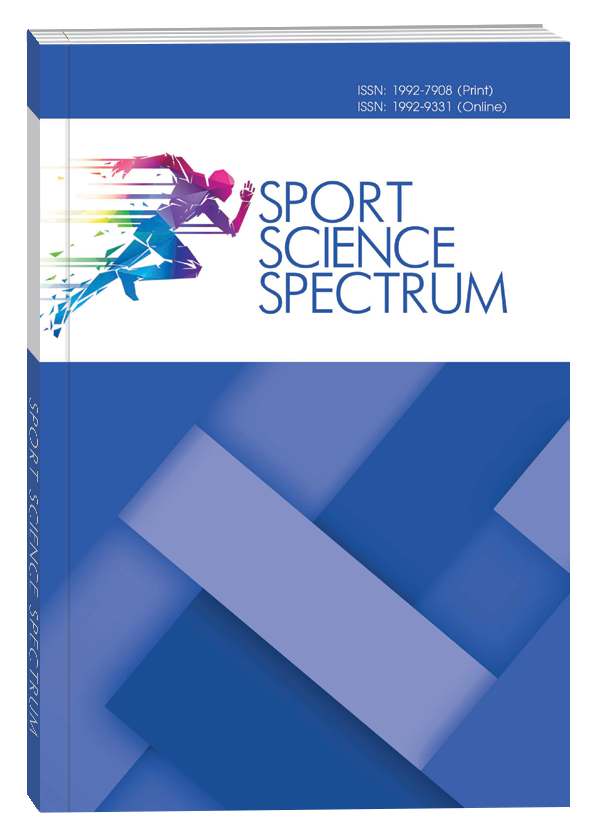TEAM INTERACTION OF PLAYERS IN THE PREPARATION PROCESS FOR DIFFERENT FORMATS OF ESPORTS COMPETITIONS
DOI:
https://doi.org/10.32782/spectrum/2024-4-4Keywords:
esports, team interaction, psychological resilience, communication, tactical flexibility, competition format, MOBA, FPS, Battle Royale, strategy gamesAbstract
Introduction. Esports is rapidly gaining worldwide recognition as a professional activity that requires not only individual player skills but also well-coordinated interaction within a team. Success in tournaments of various formats depends on the team’s ability to communicate effectively, provide emotional support to one another, and adapt tactical decisions to dynamic in-game changes. Although individual player training is well described in the scientific literature, the specifics of team interaction across different disciplines (MOBA, FPS, Battle Royale, strategy games) and competition formats (online, offline, various tournament brackets) remain insufficiently studied.The aim of the study is to analyze the features of team interaction in esports during preparation for competitions of various formats, to identify key factors (communication, psychological resilience, tactical flexibility), and to develop practical recommendations for their improvement.Research methods. This work is based on theoretical analysis and synthesis of scientific and methodological literature, content analysis of publications (including surveys of coaches and players), as well as comparative methods for examining the specifics of various esports disciplines. Observational methods and the analysis of tournament match replays made it possible to assess the practical impact of roles, strategic decisions, communication, and the psychological environment on outcomes.Results. It was found that the level of communication, emotional regulation, and tactical flexibility are decisive factors in team interaction. The competition format significantly influences the nature of collective work: online tournaments impose higher demands on synchronized actions due to technical constraints, while in offline (LAN) competitions, psychological pressure from spectators increases significantly. Within MOBA, FPS, Battle Royale, and strategy game disciplines, differences emerge in role distribution, match pacing, and the amount of information that must be processed swiftly. It was determined that teams regularly analyzing their matches and using a comprehensive approach (combining psychological, communicative, and tactical training) consistently achieve higher results.Conclusion. chieving high performance in esports is determined not only by individual player mastery but also by the holistic formation of team interaction. Systematic work on communication, emotional support, role distribution, and strategic flexibility is particularly crucial. Future studies in this field aim to develop standardized training methodologies that take into account the specificities of various disciplines and competition formats, as well as explore innovative approaches in analytics and psychological training.
References
1. Анохін Е. Чинники, що впливають на успішність та результативність гравців у кіберспорті. Теорія і методика фізичного виховання і спорту. 2023. № 3. С. 3–10. URL: https://doi.org/10.32652/tmfvs.2023.3.3-10.
2. Пятисоцька С., Єфременко А., Подрігало Л., Петренко Ю. Обґрунтування моніторингу в кіберспорті. Освіта. Інноватика. Практика. 2024. № 12 (5). С. 65–72. URL: https://doi.org/10.31110/2616-650X-vol12i5-010.
3. Шинкарук О. Модель ігрової підготовленості гравців в кіберспорті. Спортивний вісник Придніпров’я. 2022. № 2. С. 158–68. URL: https://doi.org/10.32540/2071-1476-2022-2-158.
4. Шинкарук О. Сучасні проблеми розвитку кіберспорту. Спортивний вісник Придніпров’я. 2024. № 1. С. 239–250. URL: https://doi.org/10.32540/2071-1476-2024-1-239.
5. Шинкарук О. Формування екосистеми кіберспорту (esports) як сучасного явища спорту, культури та освіти. Спортивний вісник Придніпров’я. 2023. № 1. С. 251–260. URL: https://doi.org/10.32540/2071-1476-2023-1-251.
6. Шинкарук О. Розвиток екосистеми кіберспорту на сучасному етапі. Спортивна наука та здоров´я людини. 2024. № 1 (11). С. 233–245. URL: https://doi.org/10.28925/2664-2069.2024.115.
7. Шинкарук О., Анохін Е., Юхно Ю., Лут І., Пінчук В., Бондар М. Вплив глядацької аудиторії на популяризацію кіберспортивних дисциплін та проведення змагань. Теорія і методика фізичного виховання і спорту. 2023. № 2. С. 86–94. URL: https://doi.org/10.32652/tmfvs.2023.2.86-94.
8. Шинкарук О., Бишевець Н., Сергієнко К., Строганов С., Анохін Е. Аналіз контингенту осіб, які займаються кіберспортом. Теорія і методика фізичного виховання і спорту. 2022. № 1. С. 30–36. URL: https://doi.org/10.32652/tmfvs.2022.1.30-36.
9. Шинкарук О., Лут І., Пінчук В., Васильєв М. Вплив об’єктивних та суб’єктивних чинників на результативність команд в кіберспорті. Спортивна наука та здоров’я людини. 2024. № 2 (12). С. 186–200. URL: https://doi.org/10.28925/2664-2069.2024.214.
10. Шинкарук О., Скалозуб А., Шарга Я. Стратегії попередження та мінімізації тильту в кіберспорті. Спортивна медицина, фізична терапія та ерготерапія. 2024. № 1. С. 83–95. URL: https://doi.org/10.32652/spmed.2024.1.83-95.
11. Яковенко О., Шинкарук О., Пінчук В., Кузьменко Д. Аналіз змагальної діяльності в кіберспорті та визначення напрямів його розвитку. Науковий часопис Українського державного університету імені Михайла Драгоманова. Серія 15. 2024. № 12 (185). С. 221–225. URL: https://doi.org/10.31392/UDU-nc.series15.2024.12(185).46.
12. Яковенко О., Шинкарук О., Пінчук В., Лут І., Кузьменко Д., Куликов А. Проблеми організації змагань з кіберспорту для жіночих команд. Науковий часопис Українського державного університету імені Михайла Драгоманова. Серія 15. 2024. № 12 (185). С. 202–206. URL: https://doi.org/10.31392/UDU-nc.series15.2024.12(185).42.
13. Abramov S. et al. Analysis of video game players’ emotions and team performance: An esports tournament case study. IEEE Transactions on Games. 2021. № 13 (4). P. 102–110. URL: https://doi.org/10.1109/TG.2021.9566801.
14. Bonilla I., Chamarro A. Psychological skills in esports: Qualitative study of individual and team players. International Journal of Sport Psychology. 2022. № 53 (4). P. 245–260.
15. Caporusso N., Porebski P. Investigating the human factors in eSports performance. Computers in Human Behavior. 2019. № 101. P. 149–156. URL: https://doi.org/10.1016/j.chb.2019.07.005.
16. Fedorchuk S., Gorenko Z., Shynkaruk O., Lysenko O., Tukaiev S., Romaniuk V. Functional mobility of nervous processes in relation to the level of basal metabolism in skilled athletes. EPA 2022 “Linking Clinical Practice and Research for Better Mental Health Care in Europe” : 30th European Congress of Psychiatry, 4–7 June 2022, Budapest, Hungary. EPV 1212. European Psychiatry. Suppl. June 2022. Vol. 65. S. 924.
17. Hallmann K., Giel T. (2018). Esports – Competitive sports or recreational activity? Sport Management Review. URL: https://doi.org/10.1016/j.smr.2017.07.011.
18. Hamari J., Sjöblom M. (2017). What is eSports and why do people watch it? Internet Research. № 27 (2). P. 211–232.
19. Jenny S.E., Manning R.D., Keiper M.C., Olrich T.W. Virtual(ly) Athletes: Where eSports Fit Within the Definition of “Sport”. Quest. 2017. № 69 (1). P. 1–18. DOI: 10.1080/00336297.2016.1144517.
20. Leis O., Salo J. Stressors, associated responses, and coping strategies in professional esports players. Journal of Esports. 2022. № 2 (3). P. 98–112. URL: https://doi.org/10.1080/08952841.2021.1234567.
21. Novak A.R., Bennett K.J.M., Pluss M.A. The relationship between the quantity of practice and in-game performance during practice with tournament performance in esports. Frontiers in Psychology. 2021. № 12. P. 641122.
22. Poulus D.R. et al. A qualitative analysis of the perceived determinants of success in elite esports athletes. Journal of Sports Sciences. 2022. № 40 (10). P. 1123–1135. URL: https://doi.org/10.1080/02640414.2021.2015916.
23. Seo Y., Jung S. Experiential marketing strategies in the mobile esports industry. Emerald Insight. 2020.
24. Shynkaruk O., Byshevets N., Iakovenko O., Serhiyenko K., Anokhin E., Yukhno Yu., Usychenko V., Yarmolenko M., Stroganov S. Modern Approaches to the Preparation System of Masters in eSports. Sport Mont. 2021. № 19. S2. P. 41–47. URL: https://doi.org/10.26773/smj.210912.
25. Voronova V., Shynkaruk O., Kovalchuk V., Marchenko G. Ascertaining the Peculiarities of Athletes’ Adaptation Course to Post-Sports Life. Physical Education Theory and Methodology. 2024. № 24 (4). P. 579–585. URL: https://doi.org/10.17309/tmfv.2024.4.09.
26. Wiemeyer J., Nagorsky E. The structure of performance and training in esports. PLOS ONE. 2020. № 15 (8). P. e0237584. DOI: 10.1371/journal.pone.0237584.





